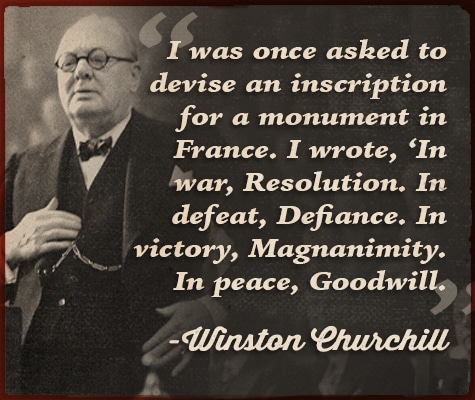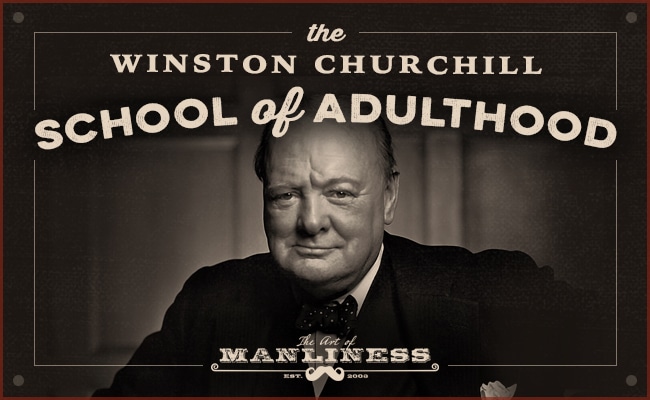
Last week we kicked off the Winston Churchill School of Adulthood by talking about two central tenets of growing up well: embracing the opportunity to author your life’s story, and cultivating a comfort with the seemingly contradictory energies and perspectives that can make that story rich and memorable.
With that foundation in place, it’s time to delve into what exactly those divergent energies are. Some of the 7 lessons to come will be shorter and more practical, others longer and more philosophical. I figured we’d start with the meatiest, most important, and perhaps most controversial of them all: developing an unshakable moral code. It is a task that involves something that many of us struggle with: allowing for the happy coexistence of both doubt and belief.
Let’s see how Churchill was able to let these two currents intermingle, while still maintaining a deep bedrock of principles.
The Winston Churchill School of Adulthood – Lesson #1: Develop a Mighty Moral Code
Churchill’s parents weren’t particularly religious, but he was raised in an environment where the Christian faith was taken for granted as a given part of life. He had attended mandatory chapel meetings during his school days, and generally accepted what he had been told.
But when he began to read more widely in his early twenties, studying philosophical and scientific texts like Darwin’s Origin of Species, he came to feel there was simply no empirical evidence that proved the veracity of Christianity, and plenty of rational reasons to doubt it. At first, Winston’s anger at being led astray caused him to reject all his old beliefs, but in time he came to feel that he didn’t have to throw out the baby with the bathwater and fit his different ideas into neat categories. As his experience is something many young men will pass through, and how he grappled with it is to my mind very instructive, it’s worth quoting in full:
“For a time I was indignant at having been told so many untruths, as I then regarded them, by the schoolmasters and clergy who had guided my youth. As it was I passed through a violent and aggressive anti-religious phase which, had it lasted, might easily have made me a nuisance. My poise was restored during the next few years by frequent contact with danger. I found that whatever I might think and argue, I did not hesitate to ask for special protection when about to come under the fire of the enemy: nor to feel sincerely grateful when I got home safe to tea. I even asked for lesser things than not to be killed too soon, and nearly always in these years, and indeed throughout my life, I got what I wanted. This practice seemed perfectly natural, and just as strong and real as the reasoning process which contradicted it so sharply. Moreover the practice was comforting and the reasoning led nowhere. I therefore acted in accordance with my feelings without troubling to square such conduct with the conclusions of thought.
It is a good thing for an uneducated man to read books of quotations. Bartlett’s Familiar Quotations is an admirable work, and I studied it intently. The quotations when engraved upon the memory give you good thoughts. They also make you anxious to read the authors and look for more. In this or some other similar book I came across a French saying which seemed singularly opposite. ‘Le cœur a ses raisons, que la raison ne connait pas.’ It seemed to me that it would be very foolish to discard the reasons of the heart for those of the head. Indeed I could not see why I should not enjoy them both. I did not worry about the inconsistency of thinking one way and believing the other. It seemed good to let the mind explore so far as it could the paths of thought and logic, and also good to pray for help and succour, and be thankful when they came. I could not feel that the Supreme Creator who gave us our minds as well as our souls would be offended if they did not always run smoothly together in double harness. After all He must have foreseen this from the beginning and of course He would understand it all. Accordingly I have always been surprised to see some of our Bishops and clergy making such heavy weather about reconciling the Bible story with modern scientific and historical knowledge. Why do they want to reconcile them? If you are the recipient of a message which cheers your heart and fortifies your soul, which promises you reunion with those you have loved in a world of larger opportunity and wider sympathies, why should you worry about the shape or colour of the travel-stained envelope; whether it is duly stamped, whether the date on the postmark is right or wrong? These matters may be puzzling, but they are certainly not important. What is important is the message and the benefits to you of receiving it. Close reasoning can conduct one to the precise conclusion that miracles are impossible: that ‘it is much more likely that human testimony should err, than that the laws of nature should be violated’; and at the same time one may rejoice to read how Christ turned the water into wine in Cana of Galilee or walked on the lake or rose from the dead. The human brain cannot comprehend infinity, but the discovery of mathematics enables it to be handled quite easily. The idea that nothing is true except what we comprehend is silly, and that ideas which our minds cannot reconcile are mutually destructive, sillier still. Certainly nothing could be more repulsive both to our minds and feelings than the spectacle of thousands of millions of universes—for that is what they say it comes to now—all knocking about together for ever without any rational or good purpose behind them. I therefore adopted quite early in life a system of believing whatever I wanted to believe, while at the same time leaving reason to pursue unfettered whatever paths she was capable of treading.”
Churchill became an agnostic in his youth, and remained so until his death. He very infrequently attended church or prayed, and his reading of scripture was limited to a few choice verses in the Old Testament that inspired his sense of stark, righteous justice. He did not rule out the existence of God, but felt that if a Supreme Power existed, He did not play a hands-on role in guiding human affairs. Befitting this Deistic perspective, Churchill did not petition the Almighty for help in defeating the Nazis, believing that the course of events would be affected by the thoroughness of his own planning and strategy, rather than divine intervention. God, Churchill allowed, may have a “Great Design into which all our human actions fit,” but it was a plan that was only manifested “if we do our duty.”
No longer being able to base his ideas of right and wrong on a religious faith did not diminish Churchill’s sense of morality one bit. He held that “morality,” as well as “all the great things,” were “eternal” in nature; as his biographer, William Manchester puts it, Churchill saw “life and history in primary colors, like Vittore Carpaccio’s paintings of St. George” and believed “in absolute virtue and absolute malevolence, in blinding light and impenetrable darkness, in righteousness and wickedness—or rather in the forces of good against the forces of evil, for the two would always be in conflict and be therefore forever embattled.”
Thus, rather than giving up on having a code of behavior altogether after its Christian underpinnings had dissolved, Churchill set about creating a new code of principles to guide his life. Amongst the texts he studied as a twenty-something were those of Plato and Aristotle. From the latter philosopher he adopted the idea of the mean – that virtue is the path that lies between two extreme courses of action. It is an ideal that requires the exercise of practical wisdom – doing the right thing, at the right time, for the right reason. As Manchester notes, Churchill “believed in Virtue and Right, not as matters of dogma, but as objective realities,” and that “Virtue was manifested in action.”
To envision the struggle of attaining the Aristotelian mean, Churchill looked to Plato’s Allegory of the Chariot. In the allegory, a charioteer, symbolizing Reason, is tasked with guiding two winged horses – one a white, spirited horse that seeks noble ends, and the other a dark, rebellious horse that seeks to satiate human appetites. A man must learn to harness these dual energies — those of heart and mind, pleasure and virtue — so that his chariot might soar into the heavens. This was the mission, and adventure, that guided Churchill’s whole life.
The Tenets of Churchill’s Moral Code
While throughout his life Churchill kept himself open to new ideas that challenged his own, the bedrock of principles he formed in his youth would forever remain unshakable. Below is a brief overview of the virtues that formed the backbone of his moral code:
Loyalty
Churchill was loyal to his friends and colleagues, almost to a fault. If someone tried to criticize a close companion, even one who had publicly disgraced himself, Churchill would stop the gossiper before they had even begun with “I don’t want to hear it. This man is my friend.”
This loyalty extended even to those who were once enemies, but had become colleagues. For three years prior to the war, Churchill blisteringly criticized Neville Chamberlain in speech and in print for his disastrous appeasement policy towards Hitler. The prime minister had watched as the Fuhrer gobbled up territories and countries, sure that if Hitler was given what he wanted, his demands would cease, and war could be avoided. In this, Chamberlain arguably did more, save Hitler himself, to precipitate the global crisis. Churchill found Chamberlain’s approach deeply wrong-headed and outright shameful, and yet once the PM decided to bring Churchill into his cabinet, Winston not only stopped criticizing him in public, but in private as well.
A friend who visited Churchill after he was brought into the government was surprised when he reprimanded one of his children at dinner for making the kind of joke about Chamberlain that would have been common currency in times past. With much solemnity, Churchill said:
“If you are going to make offensive remarks about my chief you will have to leave the table. We are united in a great and common cause and I am not prepared to tolerate such language about the Prime Minister.”
Once he and another man became comrades with a common aim, even if they disagreed on how to achieve it, Churchill would stand by him through thick and thin.
Magnanimity
Given Churchill’s ambitious, bombastic, self-assured personality, one might imagine he’d be the type to gloat and preen when proven right. Yet if Winston had this proclivity, he managed to keep an incredibly tight lid on it.
Though he had spent a decade trying to warn his countrymen of the danger Hitler posed, and though he had spent years railing against the appeasement policy that was widely popular throughout Britain, when the tide of public opinion finally turned in his favor, he never gave in to the temptation to shout “I told you so!” from the rooftops. And while it would have practically been his right to call his former critics — men who had heaped him with scorn and called him a traitor — on the carpet for a well-deserved verbal comeuppance, he refused to do so. Instead, he took exactly the opposite tack.
When Parliament began to question Chamberlain’s leadership, and the idea of replacing him with Churchill began to be seriously considered, Winston could have directly angled for the job, and jettisoned his nascent loyalty to his boss by returning to his public denunciations of him. He did not.
And, once he had been selected as the next head of Her Majesty’s Government, he could have let his relationship with Chamberlain devolve into the icy rivalry typical of political opponents. He did not. Instead, he invited his former nemesis – and some of his other erstwhile critics as well — to serve in his War Cabinet. When Chamberlain became stricken with bowel cancer, and was forced to resign the position, Churchill ordered that the former PM be telephoned with all positive news about the war.
Winston could be ruthless when fighting his enemies – in politics and in war – but he didn’t let his desire to triumph devolve into pettiness, or a bitter, blinding antipathy. He could feel a man was dead wrong – disastrously wrong, even – and yet he refused to demonize him. He told a colleague that he “hated nobody…except for Hitler, and that was professional.” So too, once a battle was won, Churchill could easily switch from a laser focus on destroying his foe, to re-forming the friendships and coalitions necessary to begin the rebuilding process. He felt that heated antagonism and revenge were simply unproductive. Anger, he posited, “is a waste of energy. Steam which is used to blow off a safety valve would be better used to drive an engine.”
Honor
Churchill believed in honor both in the sense of integrity — keeping one’s word, living up to one’s principles — and in the classical sense as well: prizing a reputation for virtue and strength, and demonstrating a willingness to defend that reputation when wronged.
In his private life, he refused to be privy to what he deemed dishonorable speech. If a dinner guest made an anti-Semitic, disloyal, or otherwise scurrilous remark, he would get up and the leave the table. At a meeting of the heads of the Allied powers near the end of the war, Stalin proposed that the army execute at least 50,000 German officers after their surrender in order to ensure the Deutschland’s submission for decades to come. “I would rather,” Churchill replied, “be taken out to the garden here and now and be shot myself rather than sully my own and my country’s honor by such infamy.” After FDR suggested a compromise – to shoot 49,000 officers instead — and his son Elliott drunkenly tottered in and gave the idea his support, Churchill stood up and left the room. Stalin followed after him to offer his assurance that it was all a joke, but Churchill, knowing the butchery Uncle Joe was capable of, was not so sure.
In his public life, it was his sense of honor that most galled Churchill about Chamberlain’s policy of appeasement. Here was a dictator that had willingly broken his promises, who was clearly lying through his teeth, and who had violated the sovereignty of Europe’s peoples…and yet England was letting him get away with it. He felt deep in his bones that such dishonorable actions required a response, a strong response, and that doing nothing was cowardly. As Germany’s power increased, and the British government continued to ignore their advances, Churchill lamented: “We seem to be very near the bleak choice between War and Shame. My feeling is that we shall choose Shame, and then have War thrown in a little later on even more adverse terms than at present.”
Resolution
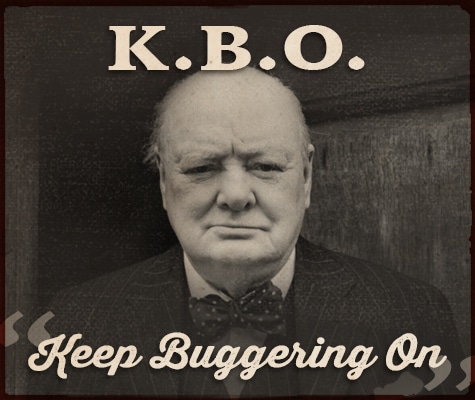
“Nothing—not his moods, not Britain’s defeats, not the slow strangulation of the U-boat blockade, not his reluctant generals—impeded Churchill’s capacity to inspire his countrymen and to fight for their salvation. Nothing diminished his love for his family. Nothing undercut his love of life.” –William Manchester, The Last Lion
If there’s one character trait Winston Churchill is best known for, it’s assuredly his resolution.
In weathering the ups and downs of his political career, he had learned to never count oneself out of the fight, and to just keep climbing towards the summit of your goal no matter what setbacks temporarily get you off track. He likened the task to that of the beaver, who “builds his dam, and thus when his fishing is about to begin, comes the flood and sweeps his work and luck and fish away together. So he has to begin again.” Begin again Churchill did, many, many times.
Thus when war descended on Europe, Churchill’s fire-tested steadfastness would be England’s greatest asset. He was the man who steeled his countrymen’s nerve with speeches that called for them to “fight on the beaches” and to offer their “blood, toil, tears, and sweat” to the cause. Throughout the war, his faith in the iron-will of his fellow Englishmen never wavered: “I feel sure we have no need to fear the tempest. Let it roar, and let it rage. We shall come through.”
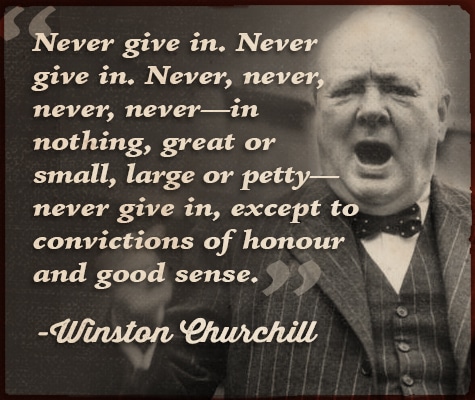
Churchill’s spirit of resolution not only helped win the war, but perhaps just as importantly, made his fellow Englishmen believe they would win the war. He not only was able to form an inner conviction to never surrender, but was able to project that assurance to others. The energy of his iron will created an aura of comfort and confidence to those who worked alongside him in the government, and to the thousands of families who listened to his speeches over the radio. Robert Menzies, the Australian prime minister, described Winston as having “no defeat in his heart,” and his personal physician, Charles Wilson, said, “I love his guts. I think he’s invincible.” Who wouldn’t sleep better at night having a wartime leader who could be described as Margery Allingham, the mystery novelist, did the Old Man:
“Mr. Churchill is the unchanging bulldog, the epitome of British aggressiveness and the living incarnation of the true Briton in fighting, not standing any damned nonsense, stoking the boilers with the grand piano and enjoying-it mood. Also he never lets go. He is so designed that he cannot breathe if he does. At the end of the fight he will come crawling in, unrecognizable, covered with blood and delighted, with the enemy’s heart between his teeth.”
Of course Churchill wasn’t really invincible; he had a propensity to growl, sulk, and kick wastebaskets over when bad news from the front came in. Yet these gloomy moods never sunk deep nor did they last. As his daughter Mary put it, his setbacks never “un-manned him.” He saw it as his duty to be the face of indomitability, even if he was feeling less than bullish himself. “It is surprising how he maintains a lighthearted exterior in spite of the vast burdens he is bearing,” Alan Brooke, Churchill’s foremost military advisor, observed.
His strength was in his ability to take things one at a time, to absorb a setback and begin the fight again the next day, to build success upon success, and to just keep pushing through it all no matter how the storm raged. K.B.O. was his motto: Keep Buggering On.
Courage
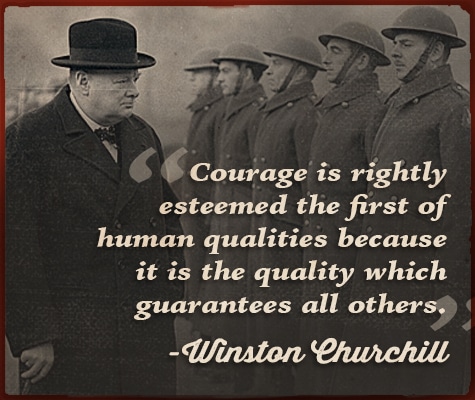
Churchill’s conviction that courage constituted the lynchpin virtue was born in his youth, when an oft-bullied boy made attaining it his primary goal: “Being in many ways a coward—particularly at school—there is no ambition I cherish so keenly as to gain a reputation of personal courage.” Without the fortitude Winston desperately sought, and gained, he never would have been able to overcome his inauspicious start and make himself into a man, and a statesman.
As a help in the task of girding up his loins, young Churchill memorized all 70 stanzas of “Horatius,” a poem by Thomas Macaulay that memorialized the semi-mythical tale of a Roman warrior who stood with two companions, guarding a bridge between his people and an entire enemy army. One of the stanzas goes:
Then out spake brave Horatius,
The Captain of the Gate:
“To every man upon this earth
Death cometh soon or late.
And how can man die better
Than facing fearful odds,
For the ashes of his fathers,
And the temples of his gods
Churchill believed in this sentiment wholeheartedly, and he spent his life proving it. He came under fire in battle some 50 times over his lifetime, and he often intentionally sought out these dangerous situations. A companion who served with Churchill in the trenches of WWI described him as “a man who had no physical fear of dying.” There were much worse things, Winston felt, than being killed in action – largely, living a boring and timid life.
While his physical courage was unquestionable, his moral and intellectual courage were remarkable as well.
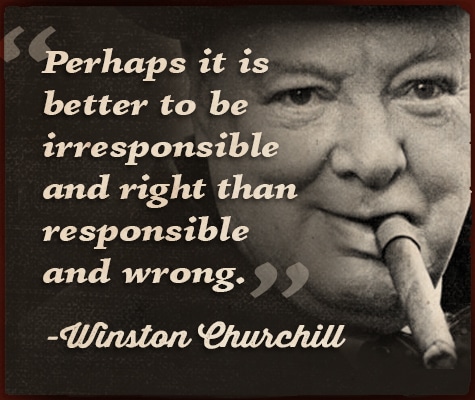
In The Lonely Crowd, sociologist David Riesman divides people into the “other-directed” and the “inner-directed.” The latter he compares to a gyroscope – they spin on their own axis, indifferent to the opinion of others. In contrast, the other-directed are likened to a radar system with antennae that are very sensitive to the opinions of others. In a time thick with antenna-men, Churchill was a gyroscope of a whole other order. He scorned public opinion polls, and didn’t stick his finger in the wind in order to match his convictions to whichever way the wind was blowing. As he put it:
“It is not a good thing always to be feeling your pulse and taking your temperature. Although one has to do it sometimes, you do not want to make a habit of it. I have heard it said that a Government should keep its ear to the ground, but they should also remember that this is not a very dignified attitude.”
Though he was certainly ambitious, and definitely loved applause, he was willing to do without power and praise when attaining it would mean compromising his convictions. During his “wilderness years” in the 1930s, he stood as a lone voice warning of Hitler’s rise and Britain’s lack of preparation for the coming of a war that few besides himself knew was imminent. He was mocked and booed for his jeremiad-esque speeches, blackballed from society clubs, and fired from a job as a newspaper columnist, resulting in a significant loss of income. Though the criticism and shunning “hurt him deeply,” he refused to trim his sails; as Manchester puts it, “The pressure from without—to remain silent—was over-powered by the pressure from within. His conscience, his very essence, compelled him to shoulder his way into the public forum again and again.”
Takeaways from Lesson #1
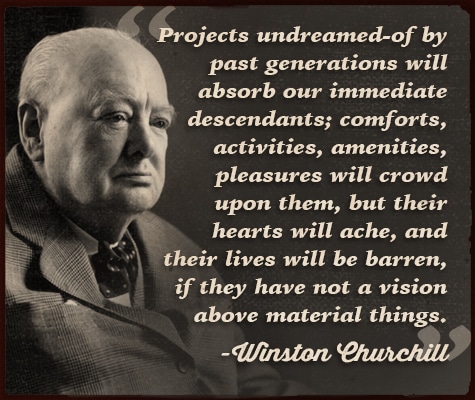
There are of course some who will be absolutely scandalized by the idea of linking Churchill with morality at all, much less using his life as inspiration to develop one’s own set of principles. Such critics will point to the fact that an ambitious Churchill switched political parties twice (though he had his reasons), that he had racist ideas (as did 90% of people at the time), and that he played a role in deepening the severity of the Bengal Famine of 1943 (though there were many more, and more significant factors at the root of it) in order to impugn his character and the viability of his being a role model. There is not space in this article, nor is it within the purview of this series, to delve into these issues; I can only say that once you read a reasonably objective 3,000-page biography on Churchill (I cannot recommend Manchester’s more strongly), rather than biased, agenda-driven articles on the internet, you will come away with a far more nuanced and balanced picture of these criticisms, and his life as a whole. The man surely had his flaws, but his worthy traits could be awe-inspiring.
So too, the idea behind this series is not to have readers attempt to implement Churchill’s precepts and methods whole cloth, but to use his life as a jumping off point for how to improve their own.
In regards to this piece, this is to say that I am not endorsing Aristotelian agnosticism as the best path for every man. Rather, the hope is that in exploring Churchill’s beliefs and moral code, readers will be inspired to create their own code. Such a code serves as the foundation for a fulfilling adulthood, and yet its possession is all too often a rarity these days.
According to Pew Research, 1/3 of Millennials aren’t affiliated with any religion – the highest percentage of any generation of the last 25 years. As Churchill demonstrated, a man’s lack of religious faith does not automatically correlate with the lack of a firm, well-defined moral code, but the two do often go hand-in-hand. The sequence of events usually goes much like it did for Churchill, with one crucial divergence: A young person questions their faith, then goes through an anti-religious phase — often accompanied by a period where they break all the old rules they used to live by — and then mellow out some. Tis a natural phase of youth. But unfortunately, the next step that Churchill took fails to be undertaken: the creation of a new moral code. One’s old beliefs are wiped away, but nothing is rebuilt in their place. Instead, the mellowing period leads to something of an indifferent stance towards the idea of Truth with a capital T. It’s a perspective embodied by a shrug, and undergirded by sentiments like “to each his own” and “just do whatever makes you happy.”
There are several reasons for a crisis of faith to end in this common result. A person may feel that without a basis in religion, there simply can’t be grounding for ideas of absolute good and evil, right and wrong. Also, as we get older, life gets a lot busier (and our brains get mellower), so we simply lose the drive and passion to explore these kinds of heady questions and seek truth. Finally, there’s an element of convenience and self-interest at play; if we remain indefinitely in a period of limbo, in which we’re not sure exactly what we believe, we can justify any choice as okay.
What Churchill shows us is that you can still have a firm bedrock of principles, even if you’re not religious, and that it’s okay to allow both doubt and belief to exist in your life. You don’t have to have it all figured out in order to have a powerful moral compass!
If you’re religious, but have some doubts about your faith, realize that’s normal. You can grapple with those doubts, or simply sit them on the shelf for a time, and still go on believing in the things you do feel sure about; you don’t need to throw out the baby with the bathwater. Be true to what you do know.
If you’ve left behind your faith altogether, you still can, and should, create a moral code for yourself. Study philosophy and decide what you believe about the nature of man, the purpose of life, and what constitutes ethical behavior. The trick is to avoid the temptation to choose a philosophy that entirely aligns with your predispositions. A sound moral code always involves a degree of struggle and sacrifice; “Being in many ways a coward—particularly at school—there is no ambition I cherish so keenly as to gain a reputation of personal courage.”
And even if you’re religious, and have never had a doubt about your faith, you still should go through the process of examining your beliefs, so that you know why you hold them, that you’ve truly chosen them for yourself, and gain a deeper understanding of the code by which you live.
In other words, just because you’re not sure about everything in the world, doesn’t mean you can’t be sure of anything. And just because you’re sure of some things, doesn’t mean you should ever stop seeking after truth, as long as you keep acting on the truth you’ve already obtained. As Manchester describes Churchill: “His abiding agnosticism precluded certainty in the matter of divine influence, but not in the matter of doing his duty.”
You can have an open mind and a bedrock of principles. In fact, as an adult, you absolutely should.
Why a Moral Code Serves as the Foundation for a Fulfilling Adulthood
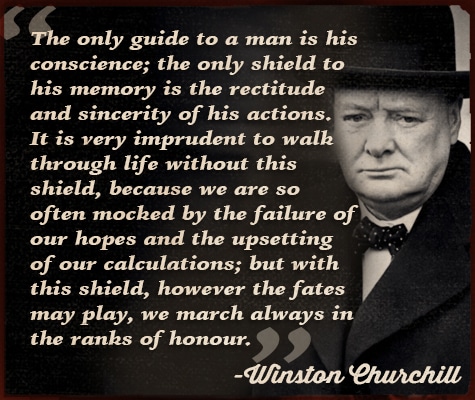
Your youth is a time for exploration, and while you should never stop exploring entirely, as you mature, you should reach a point where you have a set of beliefs that becomes firmer and firmer as the years go by.
This foundation offers several significant benefits to your life. First, it adds another layer to an existence that can otherwise often feel quite flat. You’re not just a drone that eats, sleeps, goes to work, and has sex. There’s another dimension of life to ponder and draw from. Belief in Truth gives you an interest, and makes you interesting; I find other people who have strong beliefs – even when they are diametrically opposed to my own – far more fascinating than those who have never bothered to craft a philosophy of life.
It also offers direction. When you know what your purpose is in life, you won’t aimlessly drift. You’ll be more decisive about how to act and respond in various situations. You’ve got a mission to fulfill.
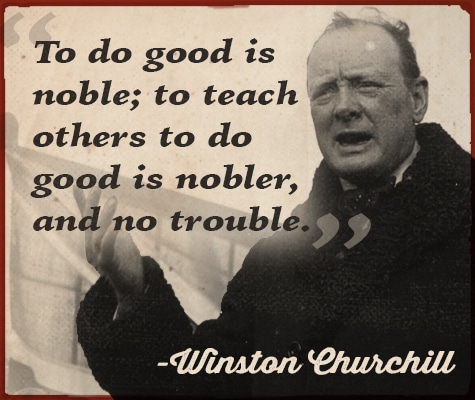
Perhaps most importantly, a strong moral code will allow you to lead and inspire others. As an adult you’ll likely have fellow travelers along for the ride with you. At times, especially tough times, they will look to you for comfort, confidence, and direction. Will you be able to offer it? Or will they turn to you and ask, “What’s the right thing to do?” and be met with a shrug?
Living with a strong moral code can sometimes be lonely. Criticize the culture, and you’ll often be mocked for voicing such an out-of-touch and ignorant jeremiad. Others may not always see what you see. As Manchester describes Winston in the pre-war years:
“In the London murk Churchill, with his moral compass, knew exactly where he was, but few Englishmen even glimpsed him…
at the time he said privately that very few Britons seemed ready to die for anything anymore; the entire country seemed crippled by a national défaillance. He had spoken to them in the tongue of Victoria’s England, itself a dead language, and there were no interpreters.”
The language of virtue has been lost to us in our day, and it may often fall on deaf ears. But a man with a moral code is still a sought-after treasure. People are drawn to him, even when they don’t know why and even if they’re not sure they agree with him. It’s because virtue creates an aura, a light that emanates from those who seek it. Churchill’s contemporaries described him as having an “inner radiance.” It was a light that set his own life aglow and lent it a brilliant resplendency, even in his darkest hours. And it was a light that brightened the path for others.
On the day after Pearl Harbor, almost 73 years ago to the day, Churchill addressed the House of Commons by saying:
“In the past we have had a light which flickered, in the present we have a light which flames, and in the future there will be a light which shines over all the land and sea.”
To which Manchester adds: “No matter that Hitler had extinguished the lamps across all of Europe, Churchill generated his own illumination.”
To be an adult is to, as author Cormac McCarthy puts it, “carry the fire” for others. Along darkened pathways we hold up a lantern to those we love so they do not stumble as they climb life’s often rocky trail. Our moral code — our bedrock of principles — creates the flame for that light. Let yours shine forth so that we all might ascend, as Churchill put it, into the “broad, sunlit uplands” of an ever better future.
Read the Entire Series
The Winston Churchill School of Adulthood Is Now in Session
A Prerequisite Class on Becoming the Author of Your Own Life
Lesson #2: Establish a Daily Routine
Lesson #3: Live Romantically
Lesson #4: Cultivate a Nostalgic Love for History
Lesson #5: Don’t Give Up Your Sense of Adventure
Lesson #6: Don’t Be Afraid to Start a Family
Lesson #7: Work Like a Slave; Command Like a King; Create Like a God
Tips on Hustling, Leadership, and Hobbies from Winston Churchill
Conclusion: Thought + Action = An Awesome Adulthood
________________________________________
Sources:
The Last Lion Trilogy by William Manchester
My Early Life by Winston Churchill
Tags: Winston Churchill

